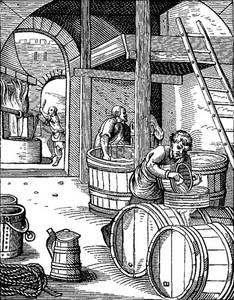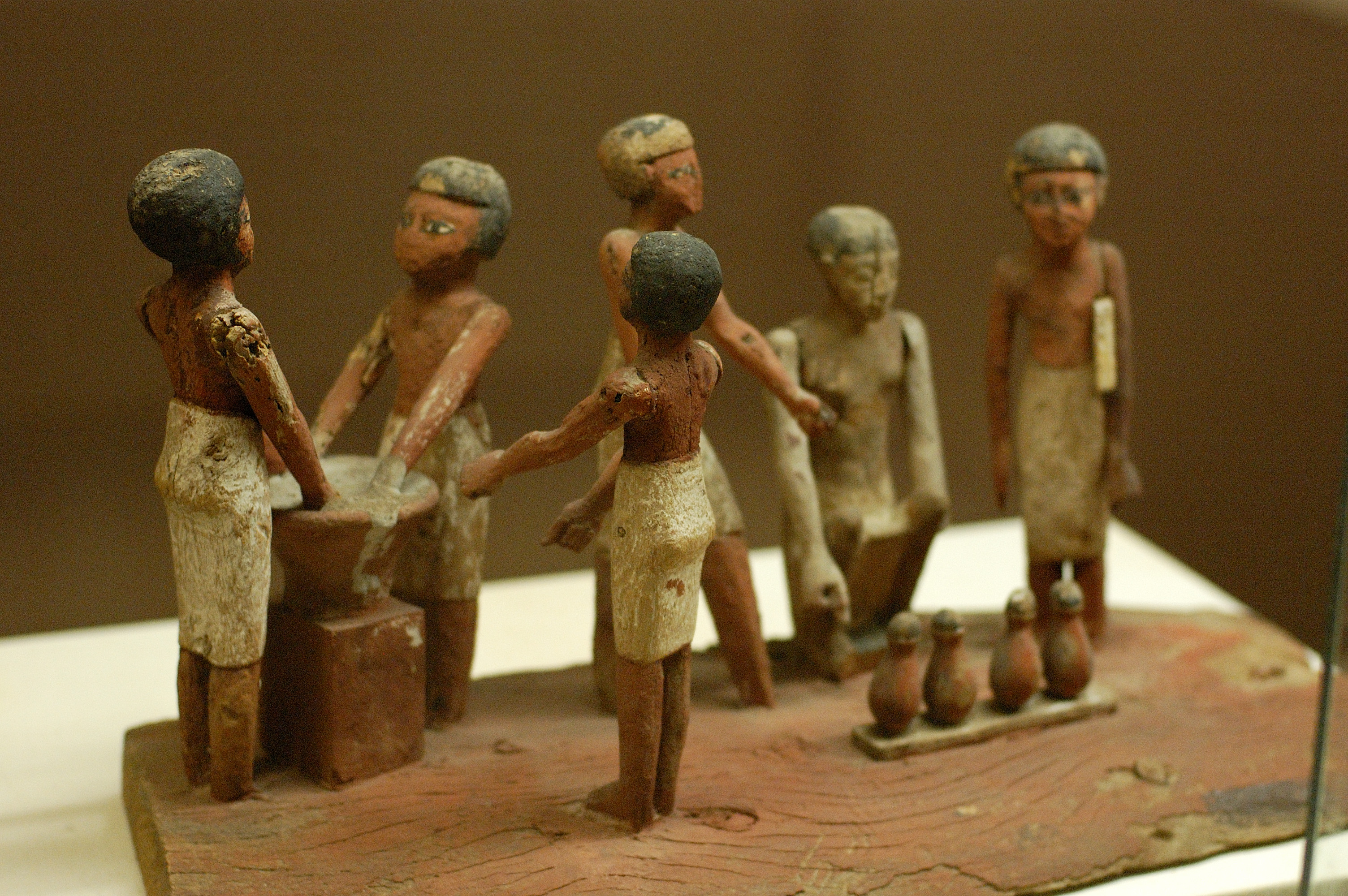The Natural History of Beer
Interview with
Meera - Beer is one of the world's oldest alcoholic beverages, dating back over seven thousand years and it's still one of the most popular drinks in society today. But how's it made? How was it discovered in the first place? I went to the Natural History Museum for one of their Darwin Live events, where the theme of the evening was the natural history of beer. I had chat to the event's speakers, Dr Dave Roberts: Head of Microbiology at the Natural History Museum and Dr Robert Simmons: Curator of Archaeology at Fishbourne Roman Palace. Now, although many of us are beer drinkers, not all of us know just how this beloved beverage is actually made so I asked Dave to tell me what's involved.
 Dave - Well, beers can be made from more or less any cereal-grown grain. Traditionally we use barley. It's malted, which means to germinate it which allows the starch in the grain to be turned into sugar. The sugar is then fermented with a yeast and the resulting liquor is beer. These days we add hops to make the beer bitter otherwise it's rather sweet for modern palates.
Dave - Well, beers can be made from more or less any cereal-grown grain. Traditionally we use barley. It's malted, which means to germinate it which allows the starch in the grain to be turned into sugar. The sugar is then fermented with a yeast and the resulting liquor is beer. These days we add hops to make the beer bitter otherwise it's rather sweet for modern palates.
Meera - Ok, and how has technology and the brewing process changed since that date?
Dave - Today industry is fully technological. It's using essentially large stainless steel vessels, computer controlled breweries. We have the science of brewing. We know exactly how to control it now and so you can go to a brewery, push a button and the entire process will happen under computer control. The product will be identical every time it comes out.
Meera - Now, moving onto the people that were actually drinking the beer. How far does beer go back? When's the earliest trace of people drinking beer?
Dave - The earliest definitive evidence for honest-to-goodness beer is about 3000BC. That was in Sumeria. But we have evidence from sculptures and from writing in Egypt back to about 5000BC. Cereal grains were being collected as far back as 23,000 years ago and the question then becomes, well, how do you eat cereal grains? Cereal grains themselves are very hard and so you can't just chew them because we simply don't have the teeth for it. It's much easier if you soften the grains first. If you soften them by soaking them in water then you can smash them open. At 23000 years we have no known way of cooking other than making them into a paste and putting them onto a hot stone. It's perfectly conceivable that if you were a little bit late, a little bit tardy in doing this that they would have fermented. If they were left in water, then the water would have gone fizzy and would have actually been safer to drink than stream water.
Meera - So you think it may have happened by accident?
Dave - I think it more or less must have.
Meera - How about you, Robert?
Robert - There has been an argument in the past that beer wasn't originally brewed, if you like, by accident from failed bread production. But was actually the original product and bread came later. Now it's a debate that's run on and on but it's an interesting idea and quite plausible because beer is actually more nutritious than bread would have been.
Meera - When beers, say, first started being drunk was it associated with everyday people? Was everybody drinking it or was it associated with different classes, do you think?
Robert - The way I imagine for the production and consumption of beer to have taken place, it was a big communal get-together. There were fairly small groups of people living in the English countryside and they would have brewed large quantities of this stuff possibly 100 litres, maybe 150...maybe more. It wouldn't have a long shelf life so once it's brewed it's gotta be drunk. Ethnographic examples suggest that it would be within 24 hours. Even if it's got to be drunk within 2-3 days, that's a big party! And everybody would get involved and everybody would help drink beer.
 Dave - It's also the case that in ancient Egypt we know from hieroglyphs that beer was drunk regularly with meals. With all meals, by everyone in society: from the Pharaoh right down to the smallest child. But it was also associated with at least three of the gods in ceremony. It was as Rob said, everybody seemed to drink beer because it was a major food source.
Dave - It's also the case that in ancient Egypt we know from hieroglyphs that beer was drunk regularly with meals. With all meals, by everyone in society: from the Pharaoh right down to the smallest child. But it was also associated with at least three of the gods in ceremony. It was as Rob said, everybody seemed to drink beer because it was a major food source.
Meera - So there you have it, drinking beer isn't only about the alcohol content but the nutrition as well. I guess the real question here is, what came first? The bread or the beer? Either way I'm glad it was discovered because I, for one, am a big fan of this liquid bread! Especially now that lots of pubs and bars are expanding their beer menus. But how can I tell what a truly good beer is and taste all the flavours that are meant to be in there? I spoke to Julian Herrington, a master brewer. He took me through a traditional beer tasting, to teach me how to really enjoy my pint.
Julian - First of all, you should swirl it to get the aroma off it. If you treat it like a wine, take some time over it - look at it, consider it and then swirl it to get all of those lovely citrus-y hops off it. Those orangey, lemony flavours.
Meera - So now you've got me swirling my pint, what next?
Julian - Now you have to taste it. You need to let it roll over the tongue and the tongue initially tastes the crude flavours, the sweetness, the acidity, the sourness or the bitterness. Now as it warms up on the tongue and as the carbon dioxide comes out of the beer, because there's a lot of fizz in it, that lifts the aromas. It picks up the smell, giving the deeper, more plum-y, basically fruit flavours that you can't smell until they come off the tongue as it warms up.
Meera - Mmm. That tasted good!
Julian - I'm just getting lots of raisins and fruit. Lots of fruity beers.
Meera - What type of beer is it that we're drinking then?
Julian - We're drinking a real ale or cask beer. This is one that isn't pasteurised and the yeast is allowed to sediment. It's a very natural way and it's how all beer, even beers in Europe were made before they had the fizzy, filtered beers that we have now. Beers are very complex. They have a bit more than grapes. The hops are the grapes of beers, There's the malt and all the things that we do with the malts. Crystal types of malts and lots of flavours in there. There's over 1000 brewing yeasts which can give you different flavour notes and then it depends what you do in the brewery.
Meera - Right, so that's swirl and sniff. Sip. Roll over your tongue, then look for the hang and after-flavours that come out. Got it. Next time you're at the pub, why not sample some different beers to your usual and apply these tasting techniques to see if you can find all the flavours. Who knew drinking beer could be so complicated?
- Previous The Secrets of Beer
- Next Hop Extracts for Better Beers










Comments
Add a comment